|
Eve Higby Showing Up for Racial Justice partners with BIPOC-led organizations, supporting their efforts and following their lead. What do our partners do and how do we show up for Black, Indigenous, and People of Color? How does accountability manifest in these relationships? This article is part of a series exploring these questions in depth for the fifteen community partners of Bay Area SURJ. CURB’s work
Californians United for a Responsible Budget (CURB) is a coalition of over 80 grassroots organizations working for decarceration in California. Their mission includes reducing the number of incarcerated people, reducing the number of prisons and jails operating in the state, and redirecting funds away from the correctional system and into health and human services. Since this timeline was published there have been a lot of changes as organizers reassess the timeline needed to repeal California’s Three Strikes Law. Stay tuned for more information about how to get involved coming in early 2022. It’s time to repeal California’s Three Strikes law. This unjust 1994 law made it mandatory for anyone convicted of three felonies to serve 25 years to life if any two of the crimes were considered serious or violent. The result was a tidal wave of life sentences that have disproportionately affected African American, and mentally ill and physically disabled defendants, costing taxpayers billions of dollars each year. Learn more about this law here.
SURJ Bay Area partner organizations CURB and Initiate Justice have formed the Repeal California’s Three Strikes Law Coalition with organizations across the state to put an initiative to repeal this law on the California ballot in November 2022. But how does change like this move from idea to reality? The short answer is through a lot of grassroots organizing and hard work! The process began in May 2021 with polling to test the concept with the electorate and determine how much work was needed. Then, the Coalition wrote the language for the proposed ballot measure in June and submitted it to the Attorney General’s office for a ballot title and summary. By SURJ Bay Area
Norman Williams was sentenced to life for stealing a car jack from the back of an open tow truck. Charles Ramirez got a life sentence for stealing a car radio. Vincent Rico, too, for the petty theft of two pairs of children’s shoes from a department store. Why such harsh sentences? All were sentenced under California’s Three Strikes Law, which made it mandatory for anyone convicted of three felonies to serve 25 years to life sentences if any two of the crimes were considered serious or violent. By Micki Luckey Showing Up for Racial Justice partners with BIPOC-led organizations, supporting their efforts and following their lead. What do our partners do and how do we show up for Black, Indigenous, and People of Color? How does accountability manifest in these relationships? This article is part of a series exploring these questions in depth for the fifteen community partners of Bay Area SURJ. 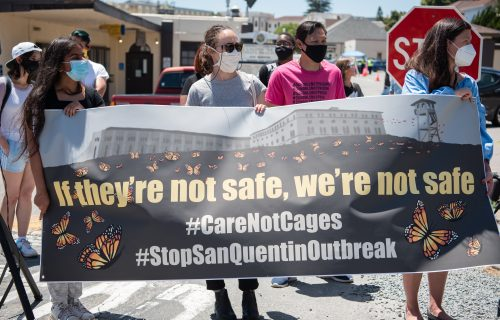 At a demonstration at San Quentin sponsored by EBC and Restore Justice, protestors hold a banner that states “If they’re not safe, we’re not safe” showing their emphasis on working with the people who are directly impacted by incarceration and in particular, by the outbreak of COVID-19 in prisons. Photograph by Brooke Anderson, Movement Photographer. By Star Zagofsky I recently watched Whose Vote Counts, Explained, a 3-episode Netflix series about voting that should be required viewing for anyone interested in racial justice. The first episode, “The Right to Vote,” starts things off with a long list of eye-opening facts like how, until the mid 1800s, it was common for non-citizens to vote in US elections. As it turns out, many voting restrictions that seem normal in the US are, in fact, not. Today more than 45 countries permit non-citizens to vote, and in 35 countries either all or most people convicted of felonies can vote, even while in prison. So why is the US different? Originally published in Common Dreams. Author: Ifoma Modibo Kambon (also known as Daryel Burnett, CDCR #B60892). I am a survivor the terrible disease of Covid-19 at Folsom State Prison. I am a survivor of the terrible negligence and deliberate indifference of individuals responsible for my care. This experience reaffirmed for me that our lives simply don’t matter. I am one of the voices and numbers assigned to a cage, a cot, a shelf, in my human warehouse. My legal name is Daryel Burnett. My California Department of Rehabilitation and Corrections (CDCR) number is B60892. My physical body has been imprisoned for 46 years. But my spirit is strong, free, and resilient. I too laugh, smile, feel, care, and love. I hold a profound respect for humanity. I am a father, son, brother, uncle, nephew, and friend. I dare to challenge people outside these walls to see and judge me through a humanistic prism. As described in our previous post The Role of Policy in SURJ’s Racial Justice Work, the Policy Working Group of the SURJ Bay Area chapter is working in service to, and in collaboration with our POC-led partner organizations that work on legislative advocacy: Californians United for a Responsible Budget (CURB), the Ella Baker Center for Human Rights, Legal Services for Prisoners with Children (LSPC) / All of Us or None(AOUON), Essie Justice Group, and Initiate Justice. As we enter the 2nd quarter of the 2019 California legislative cycle, we’d like to share the bills, propositions, and campaigns that are our focus for 2019. While we expect a few more additions, this list will give you a good idea of what we’ll be supporting (and opposing) as this year progresses.
As we continue the struggle to challenge and topple the prison industrial complex, it is important we take pause to celebrate our successes and learn from our losses. In many ways, 2018 marked a year in which legislation undoing the dark legacies of mass incarceration gained momentum. Led by the inspiring work of our POC-led partners, last year grassroots movements generated enough pressure to pass five vital pieces of criminal justice reform. Together, our actions were part of a targeted and coordinated legislative strategy that elevated the voices of the most impacted, amplified the power of our organizing, and led to some significant legislative victories in California.
#12DaysToShowUp Day 11: Invest in Communities and Policy Change to Address Mass Incarceration12/30/2018
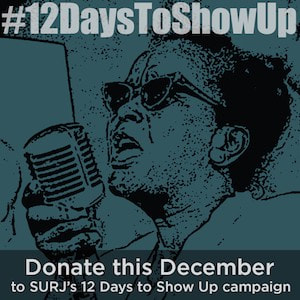 We have become all too familiar with hearing the reports of police brutality against people of color, the statistics of prisons disproportionately crowded with Black and Brown individuals, and the stories of families torn apart by extreme sentencing policies. Our nation’s history of racism is inextricably linked to our prison system and it is critical that we take real steps nowto dismantle this system and reallocate resources to our communities. 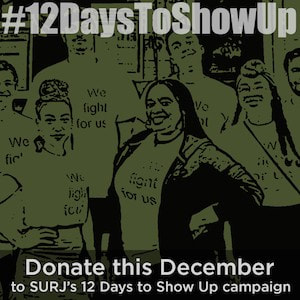 Stripping communities of their voting rights is a centuries-long tool used to silence and disenfranchise people of color — and it must stop now. The passage of the Voting Rights Act in 1965 was a major victory of the civil rights era. But in the decades since, attacks on voting rights have been relentless. In California, 162,000 citizens — mostly people of color — can’t vote today, simply because they are in state prison or on parole. |
Find articles
All
Browse by date
July 2024
MEDIUM |
© COPYRIGHT 2017-2024 SURJ BAY AREA. ALL RIGHTS RESERVED.

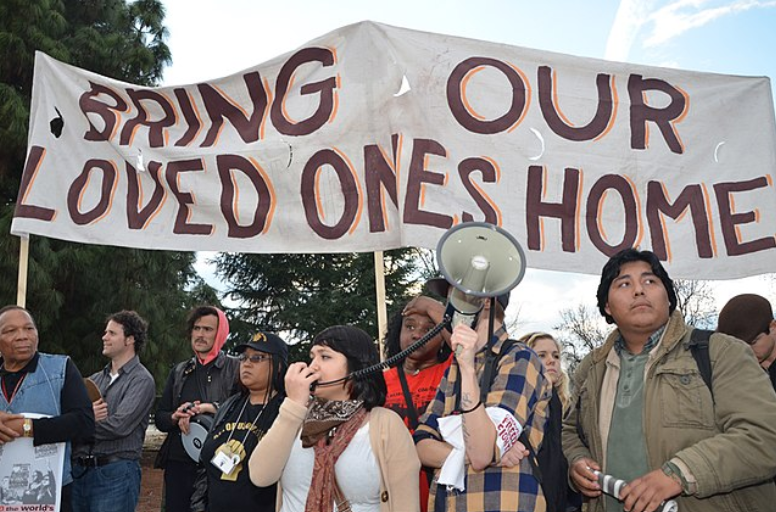
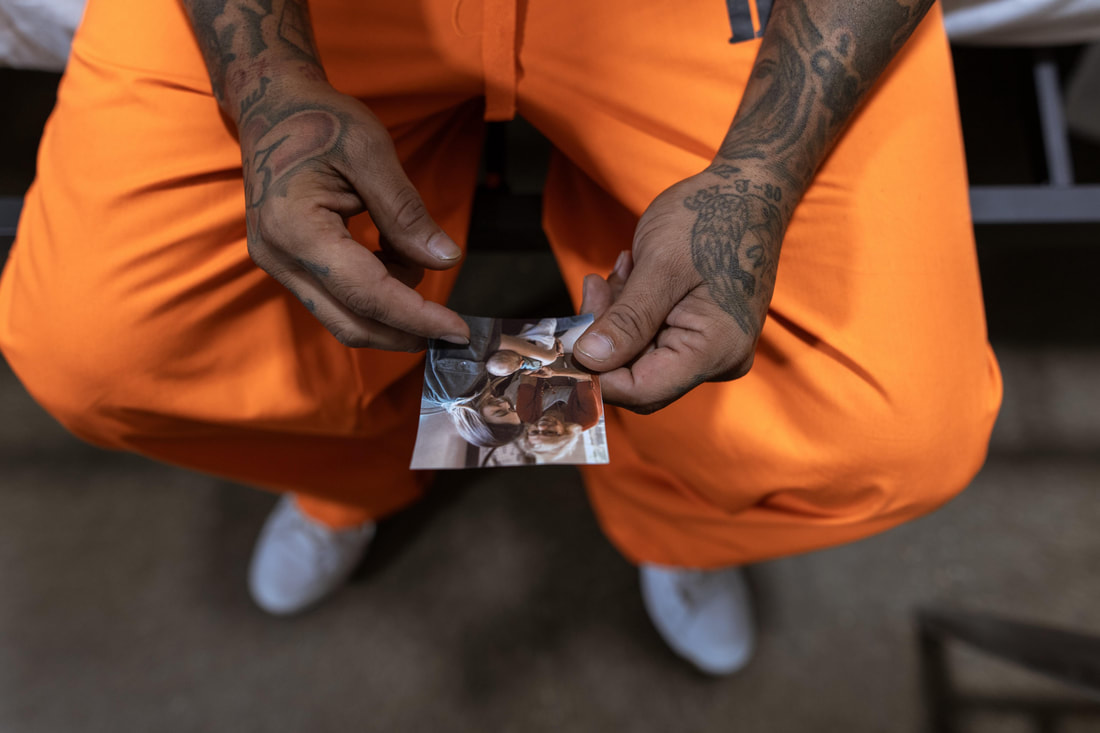
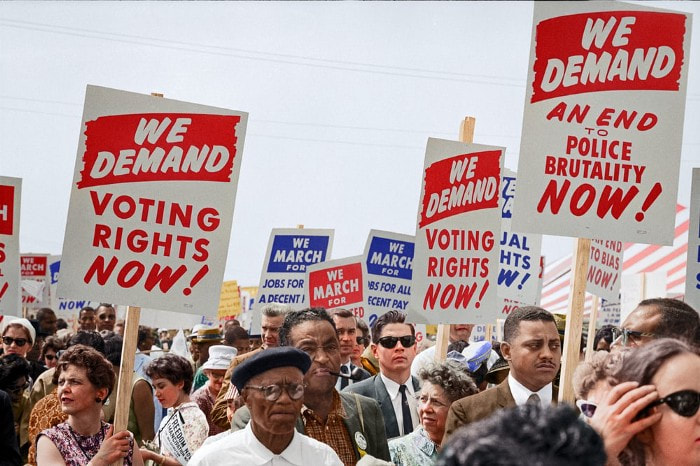
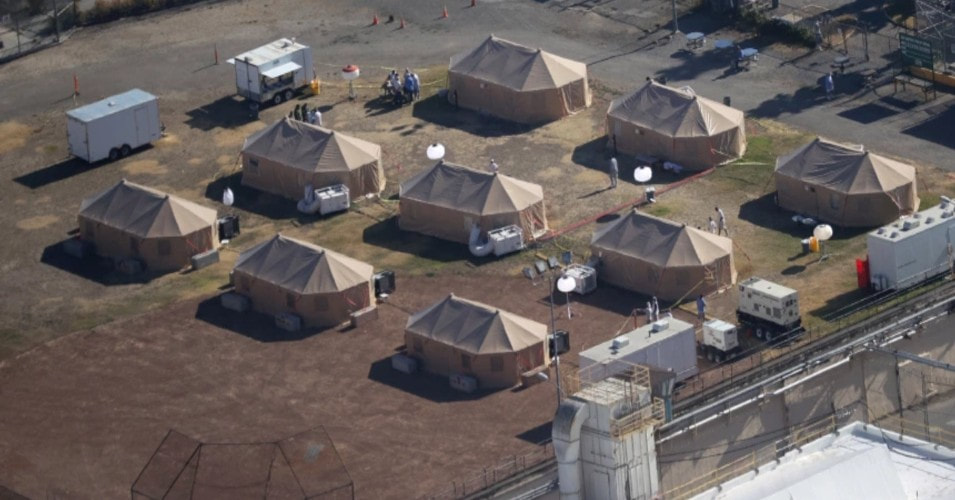

 RSS Feed
RSS Feed